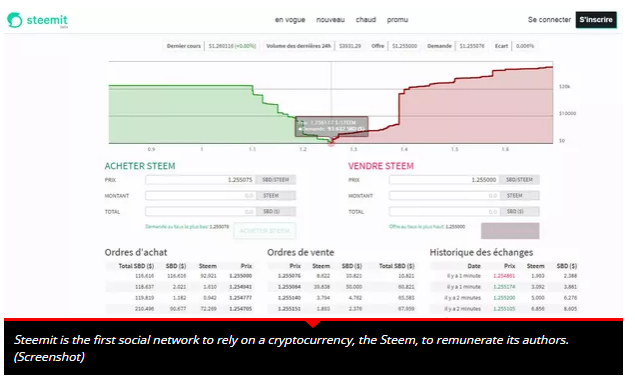Steemit, the social network where texts cannot be deleted
That day, Camille won 160 euros. She posted recordings of her get-away, made a "live" to show her a player in the computer game, took photos of the tennis shoes she had quite recently purchased to educate her local area regarding the great arrangement, answered to a part's message who requested a tune to be converted into English… Camille doesn't utilize Facebook, Twitter, YouTube, or Snapchat. She is one of the million enrolled clients on Steemit . Dispatched in March 2016, it is the main interpersonal organization to depend on a digital currency, the Steem, to compensate its creators. Here, we don't "prefer", we "upvote".

The more votes you get, the more steems you get. Of the absolute income, 75% will go to the creator (which he can change into his nation's money) and 25% to the keepers (the people who casted a ballot). "In any case, you must be trailed by a ton of adherents, clarifies the youngster. Since I explore on this stage, I have less the impression of burning through my time. My substance has a worth. I would rather that it benefits me. rather than Facebook. Also, it's fulfilling and rousing. "
"Give power back to individuals"
With a solitary record, the client explores between the diverse decentralized applications connected to the Steem blockchain: Steemit, Dtube to see recordings, Dlive to observe an occasion, Steemhunt and Blockdeals to carry on with work or Musing to share information. . There are more than twenty of them. In mid-May, during the "Agreement 2018" meeting in New York, one of the prime supporters, Ned Scott, said he needed to "foster organizations and enable individuals".
This way of thinking of independence which means to dispense with any go between the maker and the purchaser is the very justification for digital currencies. Made in 2008, these computerized monetary standards are an "combination" of cryptographic methods and decentralized organizations. They have been extraordinarily formed with the goal that no outside power (physical, moral or state) can mediate to change their execution or their information. They create a blockchain that stores data sequentially. Any substance consumed there is actually sealed, unquestionable and difficult to eliminate. Like it or not.
Will laws need to adjust to blockchains?
Steemit depends on this specialized basic at the beginning of all digital currencies and utilizations a blockchain to save the literary information of its clients. So it's ideal to reconsider composing anything on the informal community. If the UI of these decentralized applications gives the deception of having the option to adjust its substance, it isn't. Steemit Content Director Andrew Levine clarifies, "Nobody has the ability to mess with a blockchain. On our own, on the off chance that a post is refreshed, the client doesn't change the old adaptation. , it adds another. The UI is utilized to pick what data ought to be shown and how it ought to be shown. " She just gives
In this specialized setting of changelessness, where the client can't eradicate his information or conjure any option to be neglected, how might the GDPR or against counterfeit news laws apply? David Teruzzi, author of blockchain-conseil.fr, clarifies: "Confronted with the oversight safe nature of a blockchain, the controller will truly struggle halting the development of the most powerful innovation ever. position isn't political, freedom advocate or other, yet the product of a stringently specialized thinking. There are right now more than 1,500 blockchains. Confronted with this rise, we have the inclination that the laws should adjust to blockchains and not the opposite way around. "